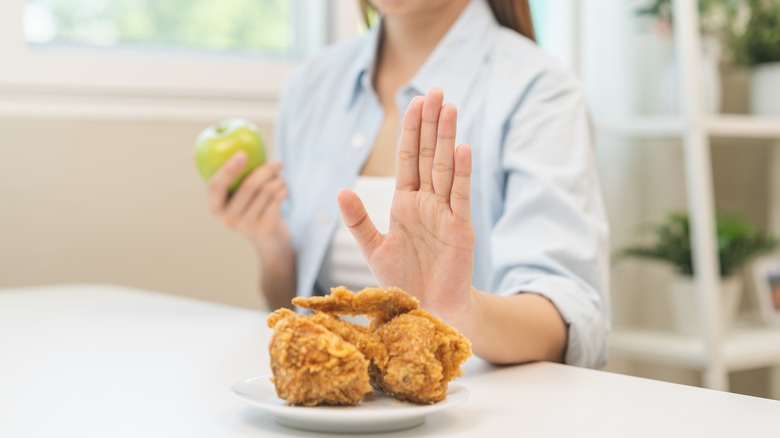Why TikTok's 'Fear Food Challenge' Could Be More Dangerous Than You Thought
TikTok offers fun and sometimes controversial food trends such as Rock-Paper-Scissors-Eat or Eat What You Want, Add What You Need. But some TikTok trends are riskier than you realize, such as the Fear Food challenge. The challenge involves writing down the names of foods that you fear and then choosing one from a jar. To defy your fear of this food, you devour it on camera. One TikTok user's "fear food Friday" showed her eating a cheese panini, while another woman had designated an entire day to eat foods that she previously feared when she struggled with an eating disorder 10 years ago.
The intention behind the Fear Food challenge is to help people struggling with eating disorders, but Registered Dietitian, Certified Intuitive Eating Counselor, and Body Image Coach Brittany Modell says this challenge can worsen an eating disorder. "Forcing yourself to eat a fear food on camera without additional support or health professionals may be distressing and ultimately activate the eating disorder further," she said in an exclusive interview with Health Digest. "Challenging fear foods is an important part of eating disorder recovery and it can trigger strong emotional responses, especially when feeling external pressure on social media."
Fearing food is a sign of an eating disorder
People who struggle with eating disorders or disordered eating are familiar with fear foods. Brittany Modell says fear foods are typically avoided for their fat, calories, or sugar content. They might also have textures or other attributes that could link them to a past trauma. "Fear foods often can increase negative feelings and emotions, making it very distressing and dysregulating for the person exposed to the food," she said.
According to the National Eating Disorders Association, avoiding or eliminating specific foods is a common sign of an eating disorder. An eating disorder also makes someone overly concerned with food, calories, and dieting. "Diet culture and social media can contribute to heightened anxiety around food by perpetuating 'good foods' and 'bad foods' messaging," she explained. "Food rules and food fears are often rooted in weight stigma and anti-fat bias and can cause a lot of harm for those especially struggling from an eating disorder."
Modell adds that social media might provide a community for people recovering from an eating disorder. People can feel seen and heard on platforms like TikTok, and they can share their journey to recovery. "However, social media can also be a hotbed for harmful eating disorder messaging, ultimately pushing someone further into their eating disorder," she stressed.
Strategies to help your recovery from an eating disorder
If you believe you have an eating disorder, Brittany Modell says the first step is to get professional help. A licensed counselor or therapist who specializes in eating disorders can help you let go of unhealthy eating behaviors and learn healthy ways to support your emotional pain. This could include writing in a journal, walking in nature, or reading a book.
Fear foods keep you locked into rigid rules about eating. "When working with fear foods, the goal is often to slowly reintroduce fear foods back into the diet," Modell explained. "With the help of an eating disorder provider, you can begin to list out a range of fear foods and slowly navigate each one."
Recovering from an eating disorder will help you find a healthy relationship with food that doesn't involve a preoccupation with eating. You'll also see food as fuel and recognize what's best to keep your body nourished and strong. Working with a professional will also help you find a healthy relationship with yourself that isn't rooted in how you look. You might also want to avoid comparing yourself with others by taking a one-week break from social media.
"Eating disorder recovery is individual and not one size fits all," Modell said. "That being said, we want to be careful when it comes to social media and the impact it may have on our mental health."


